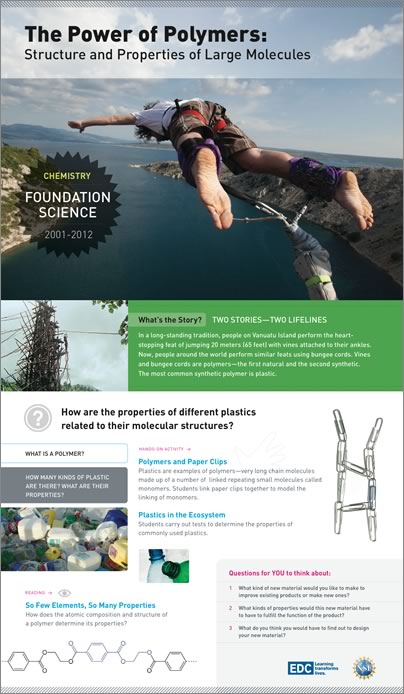 Chemistry
Chemistry
Foundation Science: Chemistry, now entitled Chemistry: Concepts and Practices and published by Carolina, is a full-year introductory course in chemistry for high school that emphasizes active, inquiry learning and is fully aligned with the Next Generation Science Standards. The curriculum focuses on how matter is organized into substances and mixtures, the differences between physical and chemical change, and the relationships among bonding, atomic arrangement, and the properties of materials.
Four big ideas that relate to matter and changes in matter are covered in this course.
- Matter on Earth is essentially a collection of individual substances. A special group of substances, called “elements,” can combine to form all other substances. Each substance is defined by its characteristic properties, which are directly related to that substance’s arrangement of atoms, ions, or molecules, and the forces between them
- Substances undergo a number of different kinds of physical, chemical, and nuclear changes that involve the rearrangement of matter and energy transfer and transformation.
- The formation and breaking of bonds between atoms and molecules is a dynamic process that is influenced by external factors.
- A deep understanding of atomic structure and the interactions among atoms is prerequisite knowledge for the human endeavor of designing materials with specific characteristic properties.
The first semester of Chemistry: Concepts and Practices is an introduction to fundamental concepts of chemistry, including the physical and chemical properties of matter, the organization of the periodic table, physical and chemical change (including the energy transformations and transfers that accompany those changes), atomic structure, atomic bonding, and the basic principles of organic chemistry. In the second semester, students apply and deepen their understanding of concepts they learned in the first semester as they are introduced to the concepts of the gas laws, moles, polarity, the details of combustion, acid-base, and oxidation-reduction reactions, reaction kinetics, and nuclear chemistry. In both semesters, these concepts are explored in contexts related to products and events that are used or occur in everyday life.
Read more about Chemistry: Concepts and Practices.
Mini site: Using the History of Science in the Chemistry Classroom

